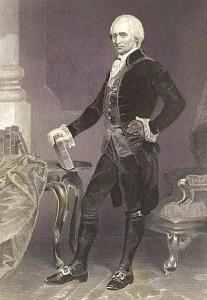Related Topics
Robert Morris: Think Big
Robert Morris wasn't born rich, or especially poor, but he was probably illegitimate. He had no recollection of his mother; his father, a tobacco trader in England, emigrated to Maryland and died rather young. It didn't take long for young Robert to become one of the richest men in America.
Robert Morris: The Dark Side
The richest man in America suddenly was locked in debtor's prison, $12 million in debt. While in prison, he reduced that to $3 million, and got released under a new bankruptcy law he helped devise.
Richard Henry Lee: A Pennsylvania Viewpoint

|
| Patrick Henry |
Although Colonial Massachusetts was combative and outspoken in its demands for liberty, somehow, pacifist Quaker Pennsylvania still got along with Bostonians reasonably well. It was Virginia that was always in Pennsylvania's face, proud, loud and defiant. Patrick Henry was certainly one of Virginia's leaders, but most of the time it was the residents of Westmoreland County VA who wrangled with Pennsylvania, people with names like Washington and Lee. Some of this animosity had to do with competition for access to the Ohio territory through Pittsburgh, some of it was a strong difference in attitude toward the Indians, whom the Quakers sought to treat as equals. Eventually, there was a division over slavery. Arthur Lee had attended Eton College no less and was often the agent who acted out the repeated efforts to stir Pennsylvania from its torpor about rebellion against England. But very likely it was his brother Richard Henry Lee who schemed the most.

|
| Richard Henry Lee |
Richard Henry Lee was the author of the Westmoreland County Resolution of 1765, which essentially proclaimed to the neighbors that anyone who cooperated with the Stamp Act was going to be sorry about it. It was the same Richard Henry Lee who introduced the Virginia Resolution of June 1776, declaring that:
Americans are and of right ought to be, free and independent States, that they are absolved from all allegiance to the British Crown, and that all political connection between them and the State of Great Britain is, and ought to be, totally dissolved.
Hotheads of Virginia and Massachusetts formed a political group at the Continental Congress, usually referred to as the Eastern Party. The leadership of a Moderate Party was less clearly defined, but Benjamin Franklin, John Dickinson, and Robert Morris probably qualified. It was almost pre-destined that Morris and Franklin would have trouble with the Lee brothers, especially when Arthur was the spokesman and Richard Henry the ringleader. Like cats and dogs, they seemed to have been some sort of genetic antagonism; topics under dispute tended to vary. No doubt, Robert Morris' enormous wealth and the ease with which he accumulated, even more, irritated the Virginia gentry whose tobacco farms were starting to exhaust their topsoil. For his part, Morris was not likely to be deferential, merely to their ancestry. Morris did sign the Declaration of Independence a month late, but under the circumstances, he could no longer vote for it; Richard Henry Lee had written the Virginia Resolution which glorified the very crux of it. A Secret Committee was soon formed to obtain arms and gunpowder, including Morris and Franklin; Richard Henry Lee saw to it that his brother Arthur was added. When Arthur was sent to watch out for Morris' agent Silas Deane in Paris, Arthur got sent along to stand guard, stirring up endless trouble with Foreign Minister Vergennes. When the Lees finally caught on to the system of sending American products to France on ships that would return with gunpowder, they wanted Franklin removed, Robert Morris' brother Thomas removed, and another Lee brother William added to the group in charge of exchanging goods with the Frenchman Beaumarchais, who was a particular Lee favorite. When Beaumarchais indicated a strong preference for tobacco as the product most in demand in France, it must have set off bells in Richard Henry Lee's head. The Lee home region of Westmoreland County in Virginia dominated the tobacco trade. But Robert Morris was himself a second generation tobacco trader; the Lees had little new to teach him about tobacco. Time and again, Morris defeated the Lee brothers in some such petty quarrels. Gradually, the Lees lost credibility, particularly after scholars began to discover evidence that when the Stamp Act was enacted, Richard Henry Lee had applied for the job of a local agent, and had been rejected.
The Lees were not always in the wrong. Thomas Morris was indeed a hopeless alcoholic and an extreme embarrassment to Robert. But a more fraternal relationship might have led to Lee helping Morris ease Thomas out while concealing his indiscretions; he could have made a friend of Robert Morris for life. Morris was certainly willing to play this game; he praised Arthur Lee in public for his assistance in monitoring the secret committee, a description which at this distance is simply hilarious. John Adams in Paris might be forgiven for taking Puritanical offense at Ben Franklin's exuberant Parisian high life. It is likely the Virginia Cavaliers looked at dalliance through the same lens as the Adams family, disliking Franklin and Morris for having a jolly time, and worse still being acclaimed for it.
Originally published: Tuesday, April 05, 2011; most-recently modified: Tuesday, June 04, 2019